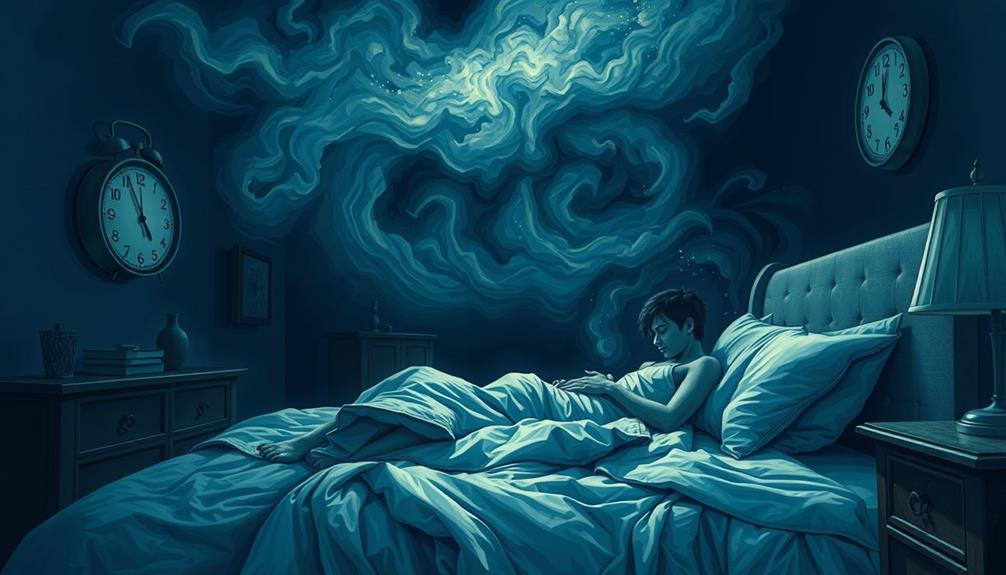If you have Borderline Personality Disorder (BPD), you might struggle with sleep disturbances like insomnia and nightmares. These sleep issues often worsen your emotional regulation, creating a cycle of distress. Emotional dysregulation makes it hard to relax and fall asleep, while trauma can lead to frequent nightmares. Regular sleep problems can exacerbate your BPD symptoms, leading to impulsive behavior and mood swings. To improve your sleep, you can try strategies like maintaining a regular sleep schedule or using mindfulness techniques. There's more to discover about effective treatments and strategies to help you manage both BPD and sleep disorders.
Key Takeaways
- Approximately 66% of individuals with BPD experience sleep disturbances, including insomnia, hypersomnia, and nightmares that exacerbate emotional instability.
- Emotional dysregulation in BPD complicates relaxation and sleep initiation, creating a cycle of poor sleep and heightened emotional distress.
- Trauma, particularly childhood abuse, significantly contributes to nightmares and other sleep issues in those with BPD, impacting overall mental health.
- Effective interventions like Cognitive Behavioral Therapy for Insomnia (CBT-I) can improve both sleep quality and emotional regulation in BPD patients.
- Future research should focus on the causal links between sleep disturbances and BPD, exploring diverse populations and intervention impacts.
Overview of BPD

Borderline Personality Disorder (BPD) is a complex mental health condition that greatly affects how you think and feel about yourself and others.
It's characterized by emotional instability, which can lead to intense mood swings and impulsive behavior. You might find yourself struggling with self-image, feeling like you're on an emotional rollercoaster that impacts your interpersonal relationships.
This instability often results in a fear of abandonment, causing you to form intense, but unstable, connections with others. Individuals with BPD may also experience chronic feelings of emptiness, which can further complicate their emotional landscape.
Symptoms of BPD can include self-harm, substance abuse, and patterns of behavior that can be misdiagnosed as other psychiatric disorders, like bipolar disorder.
The diagnosis of BPD requires a thorough clinical assessment to differentiate it from similar conditions. Unfortunately, due to overlapping symptoms, misdiagnosis can frequently occur, delaying the treatment you need.
Treatment for BPD typically involves psychotherapy, which can help you develop coping strategies and improve your emotional regulation.
Understanding BPD's symptoms and how they affect your life is essential for managing the condition and fostering healthier relationships.
With proper support and treatment, you can work towards a more stable emotional landscape.
Sleep Disturbances in BPD

Approximately 66% of individuals with Borderline Personality Disorder (BPD) report experiencing sleep disturbances, which can greatly affect their emotional well-being.
These disturbances often manifest as insomnia, hypersomnia, and nightmares, leading to significant challenges in emotional regulation and overall mental health. You might find yourself caught in a vicious cycle where your sleep issues exacerbate your BPD symptoms, and your emotional dysregulation worsens your sleep quality.
Sleep challenges can be particularly pronounced during vital periods of emotional stress, highlighting the importance of understanding these patterns in relation to key domains of development.
Research shows that BPD patients exhibit altered sleep architecture, including shortened REM latency and increased REM density compared to healthy individuals.
These changes can contribute to various functional impairments, such as:
- Difficulties in self-care and daily activities
- Impaired cognitive functioning and decision-making
- Challenges in social and emotional interactions
Addressing sleep disturbances in BPD is essential, as improved sleep quality can help stabilize emotions and enhance daily functioning.
By recognizing the relationship between sleep disturbances and emotional dysregulation, you can take steps towards better mental health.
Prioritizing healthy sleep habits may not only alleviate your symptoms but also improve your overall quality of life.
Causes of Sleep Issues

Understanding the causes of sleep issues in BPD is essential for improving your overall well-being. Heightened emotional arousal can make it tough to relax and fall asleep, while traumatic experiences often lead to nightmares that disrupt your rest.
Additionally, neurobiological factors can throw your sleep regulation off balance, making it even harder to achieve quality sleep. Factors such as cold medications overview may also play a role in sleep disturbances, as some medications can affect sleep patterns.
Emotional Arousal Impact
Heightened emotional arousal plays a significant role in the sleep issues faced by individuals with borderline personality disorder (BPD). This state of hyperarousal makes it challenging for you to relax, often leading to difficulties in initiating sleep. Your hyperactive mind can keep you awake at night, resulting in frequent awakenings and exacerbating sleep disturbances.
Understanding the emotional impact of such conditions is essential for developing effective coping strategies.
Consider these factors:
- Emotional dysregulation: Intense emotions can spiral out of control, making it nearly impossible to find calmness.
- Traumatic experiences: Past traumas often manifest as nightmares, further disrupting your sleep patterns and emotional stability.
- Circadian rhythms: Dysregulation of these rhythms in BPD patients can make it even harder to achieve restful sleep.
This creates a vicious cycle where sleep disturbances worsen your emotional dysregulation, fueling further insomnia.
The interplay between heightened emotional arousal and disrupted sleep can leave you feeling trapped, struggling to regain control over your nights. Understanding this connection can be an essential step toward finding strategies to improve your sleep and emotional well-being.
Nightmares and Trauma
Nightmares often plague individuals with borderline personality disorder (BPD), serving as a painful reminder of past traumas. These vivid disturbances can trigger emotional dysregulation, making it even harder for you to cope with daily life.
If you've experienced childhood abuse, you might find that your nightmares are more frequent and intense, heightening feelings of fear and anxiety. Additionally, incorporating calming techniques such as essential oils for relaxation may help alleviate some of the anxiety associated with these nightmares.
These nightmares disrupt your sleep continuity, complicating your ability to initiate and maintain sleep. As a result, you may feel drained, leading to increased impulsivity and aggression throughout your day.
The emotional turmoil created by these sleep disturbances can negatively impact your mental health outcomes, leaving you feeling stuck in a cycle of distress.
Addressing nightmares is vital for improving your overall well-being. By understanding the connection between your past trauma and sleep issues, you can take steps toward better sleep hygiene and emotional regulation.
Seeking professional help can also be beneficial, as it may lead to strategies that reduce nightmares and enhance your sleep quality. Ultimately, working on these aspects can pave the way toward greater emotional stability and a more fulfilling life.
Neurobiological Sleep Regulation
Sleep disturbances in individuals with borderline personality disorder (BPD) often stem from neurobiological factors that disrupt normal sleep regulation. These disruptions can lead to irregular sleep-wake cycles and inadequate sleep quality, affecting your daily functioning.
Heightened emotional dysregulation complicates the situation, making it difficult for you to relax and fall asleep. Additionally, individuals with BPD may experience dreams of deceased loved ones that intensify emotional distress during the night, further impacting sleep quality.
Research indicates that alterations in sleep architecture, such as shortened REM latency and increased REM density, further contribute to these issues. If you've experienced trauma, you might also find that nightmares exacerbate your sleep problems, creating a vicious cycle.
Here are some key neurobiological factors to take into account:
- Dysregulation of circadian rhythms leading to inconsistent sleep patterns.
- Emotional arousal preventing relaxation and sleep onset.
- Changes in sleep architecture impacting overall sleep quality.
Understanding these neurobiological elements is essential for addressing sleep disturbances in BPD. Ongoing studies continue to explore how these factors interact and influence your sleep-wake cycles, ultimately aiming to improve your emotional and physical well-being.
Effects on Emotional Regulation

Emotional dysregulation is a core challenge for those with Borderline Personality Disorder (BPD), and it often worsens with poor sleep. Sleep disturbances, including insomnia and nightmares, greatly exacerbate emotional instability, making it harder for you to manage your feelings effectively.
When you experience disrupted sleep, impulsivity may increase, creating a vicious cycle that heightens the symptoms of BPD. This cycle can lead to lack of emergency fund in emotional support and resources, further complicating your situation.
Insomnia and other sleep issues lead to cognitive impairments, further complicating your ability to regulate emotions. Studies show that these insomnia-related behaviors are closely linked to emotional dysregulation, suggesting that sleep problems may perpetuate your emotional instability.
As a result, you may find it increasingly difficult to function in daily life.
To combat these challenges, interventions like Cognitive Behavioral Therapy for Insomnia (CBT-I) can be beneficial. By addressing sleep disturbances, CBT-I has the potential to improve your emotional regulation, enhancing your overall functioning and quality of life.
Prioritizing better sleep can be an essential step in breaking the cycle of emotional dysregulation and fostering a more stable emotional state in your life.
Sleep Management Strategies

To improve your sleep quality while managing BPD, it's vital to focus on effective sleep hygiene practices.
Incorporating gentle stretching before bedtime can help relax muscles, while yoga poses for back pain can also promote better sleep.
Additionally, cognitive behavioral techniques and mindfulness methods can enhance your nighttime routine.
Sleep Hygiene Practices
Maintaining good sleep hygiene is vital for individuals with BPD, as it can greatly enhance both sleep quality and emotional stability. By establishing healthy sleep habits, you can improve your emotional regulation and minimize the disruptive effects of BPD on your life.
Additionally, ensuring that your sleep environment is free from allergens can contribute to a more restful night, similar to maintaining clean air with an air purifier maintenance routine.
Here are some effective sleep hygiene practices to keep in mind:
- Create a restful sleep environment: Reduce noise and light in your bedroom to promote better sleep quality.
- Limit stimulating activities: Avoid engaging in activities that heighten emotional arousal before bedtime, such as intense exercise or screen time.
- Incorporate mindfulness and relaxation techniques: Think about practicing meditation or deep-breathing exercises to ease your mind before sleep.
Additionally, maintaining a regular sleep schedule can help you fall asleep more easily and stay asleep longer.
Limiting caffeine and alcohol intake in the evening is also important for facilitating better sleep onset.
If you continue to struggle with sleep, consider exploring Cognitive Behavioral Therapy for Insomnia (CBT-I) as a targeted intervention to address your sleep issues and promote healthier sleep habits.
Cognitive Behavioral Techniques
Building on the importance of sleep hygiene, incorporating cognitive behavioral techniques can further enhance your sleep management strategies, especially if you have BPD.
Cognitive Behavioral Therapy for Insomnia (CBT-I) has proven effective in addressing insomnia and improving sleep quality. This approach not only targets sleep disturbances but also supports emotional regulation, helping you manage the anxiety often linked with BPD symptoms.
Humor can also play a role in alleviating the stress that may disrupt your sleep routine; sarcastic quotes provide a light-hearted perspective that can ease emotional burdens.
By integrating cognitive behavioral techniques, you can develop a structured plan to tackle sleep issues. This might include identifying negative thought patterns that disrupt your sleep and replacing them with healthier beliefs.
Additionally, establishing a consistent sleep schedule and creating a restful environment can greatly boost your sleep hygiene.
Mindfulness practices, while not the primary focus here, also play a role in reducing anxiety and emotional arousal. When anxiety decreases, you're more likely to experience better sleep quality.
If persistent sleep disturbances continue, seeking professional help is vital. CBT-I is a recommended intervention that can help you improve your sleep patterns and overall well-being, ultimately leading to a reduction in BPD symptoms.
Mindfulness and Relaxation Methods
Incorporating mindfulness and relaxation methods into your sleep management strategies can greatly enhance your ability to cope with the challenges of BPD. Mindfulness techniques like meditation and deep-breathing exercises promote relaxation, markedly improving sleep quality by reducing emotional arousal.
Similarly, relaxation methods such as progressive muscle relaxation and guided imagery can help you fall asleep faster and decrease insomnia symptoms.
Consider these strategies to further enhance your sleep experience:
- Practice mindfulness daily: Regularly engaging in mindfulness can stabilize your sleep schedule, helping to combat sleep disturbances.
- Utilize relaxation techniques: Employ methods like guided imagery to facilitate emotional regulation and achieve emotional stability.
- Explore CBT-I: Cognitive Behavioral Therapy for Insomnia incorporates these strategies and has shown positive therapeutic outcomes for those with BPD.
Professional Treatment Options

Several effective professional treatment options exist for managing sleep disorders in individuals with Borderline Personality Disorder (BPD). One of the most beneficial therapies is Cognitive Behavioral Therapy for Insomnia (CBT-I), which helps improve sleep quality and reduces insomnia symptoms.
Additionally, Dialectical Behavior Therapy (DBT) can be adapted specifically to address sleep issues, focusing on emotion regulation skills that mitigate sleep disturbances.
Incorporating sleep hygiene practices, like maintaining regular sleep schedules and creating restful environments, is essential in your treatment plan. These practices not only enhance your sleep but can also lead to improved daytime functioning.
Research indicates that addressing sleep disturbances through integrated treatment approaches markedly improves therapeutic outcomes and overall quality of life.
Professional assessments of your sleep patterns are important in informing targeted interventions. By understanding your unique sleep issues, professionals can tailor treatment strategies that work best for you.
This proactive approach can help you regain control over your sleep and, consequently, your emotional well-being. Ultimately, these treatment options aim to enhance your overall quality of life while managing the complexities of BPD.
Future Research Directions

Future research on sleep disorders in individuals with Borderline Personality Disorder (BPD) is essential for advancing our understanding of this complex relationship.
To establish reliable conclusions about the causative links between sleep disturbances and BPD symptoms, we need longitudinal studies that track these issues over time. Larger and more diverse sample sizes will enhance the generalizability of findings, addressing current gaps in the literature.
Key areas for future research include:
- Investigating the interplay between childhood trauma and sleep disturbances, exploring how early experiences affect adult mental health outcomes.
- Examining neurobiological factors and emotional regulation mechanisms that connect sleep disorders with BPD, helping to develop targeted interventions.
- Utilizing thorough assessments that include both subjective and objective sleep measures to clarify unique sleep characteristics associated with BPD.
Conclusion
In the intricate dance between BPD and sleep disorders, you're not alone. Imagine drifting through a night sky, where restless thoughts become shooting stars, illuminating your emotional landscape. By understanding these connections and embracing effective sleep strategies, you can reclaim your nights and find grounding amidst the chaos. Professional support can be your guiding constellation, leading you toward brighter tomorrows. As research unfolds, hope glimmers on the horizon, promising new paths to peace and restful slumber.









